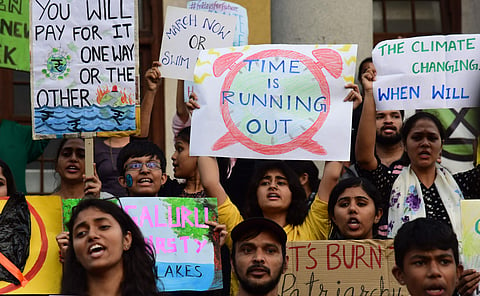

As countries around the world ponder over climate negotiations at the United Nations Climate Summit, also known as Conference Of Parties (COP) 27 in Egypt, young climate activists and leaders in India bring back the focus on educating students about climate change through school curriculum. With climate change presenting itself as one of the biggest crises right now, climate justice activists believe that students, who will grow up to be decision-makers and policy-makers, have a huge role to play in figuring out real solutions to climate change.
Existing curriculum
Referring to the current school curriculum in the country, Lakshay, who is part of Fridays For Future (FFF), India, said, "It offers very little information on climate change. It is limited to information on biodiversity and doesn't include future predictions and warnings that the recent UN reports mention." He added that the curriculum doesn't sensitise students on how they can participate in a world where climate change is happening. FFF is a youth-led and youth-organised global strike movement.
In 2021, United Nations Education Social Cultural Organisation (UNESCO) studied educational plans and curricula frameworks in close to 50 countries and found that more than half make no reference to climate change, while only 19 per cent speak about biodiversity. UNESCO, in fact, has called for Education for Sustainable Development to be a core component of all education systems at all levels by 2025.
While acknowledging that the curriculum makes cursory mention of climate change, activists also said that it only deals with broad topics such as pollution but not how developmental projects in countries need to change in order to mitigate the effects of climate change. "The actions and words of young environmental activists and advocates of climate change in India are rooted in the science of climate change. Students need to understand this science and for that, one needs to establish a discourse. Teaching it in schools will help the discourse reach a wider audience," said Sharada, a researcher at There Is No Earth B, an organisation that works towards advancing decentralised climate actions. She added that learning about climate change should be made compulsory in schools so that children can identify the consequences of actions such as littering and lifestyle changes.
To recall, the Teachers Against the Climate Crisis (TACC) claimed in July this year that the National Council of Educational Research and Training (NCERT) removed crucial chapters on the environment and climate change from the school syllabus. The group said that a chapter on the greenhouse effect was deleted from the Class XI Geography syllabus. Apart from this, a chapter on weather, climate and water was removed from the Class VII syllabus and information on the monsoon was removed from the Class IX syllabus, reported PTI. According to officials, the NCERT trimmed the curriculum for Classes VI to XII to "reduce the content load" on students in light of the COVID-19 pandemic. However, following strong criticism, Union Education Minister Dharmendra Pradhan announced that the chapters will be restored, according to reports. If it is being termed as a "burden", activists said that it can be included as part of extracurricular activities in the form of debates and discussions.
Need of the hour
Climate activist and lawyer Joie Chowdhury said that young people need to learn the history behind extreme disasters, which has colonial roots such as how fossil fuels are being used etc. "One needs to understand the rights, what solutions will work for urban and rural areas and what we can expect from our leaders," said Joie, who was speaking to us from the COP 27 in Egypt. Access to this knowledge must be given at an early age as things get politicised when they turn older, she added.
However, such access to resources to understand climate change is limited, activists pointed out. "Even if a school has a library, they will not have books on climate change. So it is necessary to make climate education accessible to everyone so that people can seek better solutions and make better choices," Lakshay said. In fact, keeping this in mind, Youth For Climate India has set up Delhi's first Climate Justice Library in South Extension II.
Not just the history, but students also need to be educated on prevention and mitigation strategies to minimise the impact of climate change. "It should not just be limited to two paragraphs of information on climate change for the purpose of answering in an exam. The content needs to be made interactive and vibrant for students to consume," said Rachit Tiwari from Youth For Climate, India.
Can we learn from other countries?
According to a report by the World Economic Forum, countries like Cambodia, Dominican Republic, Colombia and Argentina have integrated climate change into the school curriculum. The report stated that Cambodia integrated climate change into the earth science curriculum for higher secondary schools in 2020. Additionally, students learn about key approaches and technologies and 15 pilot schools were assigned to work on projects such as tree planting and climate-smart agriculture, according to the report. Similarly, Argentina's Parliament approved the National Law of Comprehensive Environmental Education in 2021 which requires environmental education to be taught in schools at all age levels.
Activists urgently call attention towards making the young population more resilient to climate change at a time when the Intergovernmental Panel for Climate Change (IPCC) report 2022 has touted India as one of the most vulnerable countries that will be affected by rising sea-levels.
